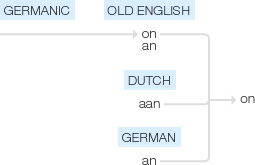On
Old English on, an, of Germanic origin; related to Dutch aan and German an, from an Indo-European root shared by Greek ana .
wiktionary
From Middle English on, from Old English on, an(“on, upon, onto, in, into”), from Proto-Germanic *ana(“on, at”), from Proto-Indo-European *h₂en-. Cognate with North Frisian a(“on, in”), Saterland Frisian an(“on, at”), West Frisian oan(“on, at”), Dutch aan(“on, at, to”), Low German an(“on, at”), German an(“to, at, on”), Swedish å(“on, at, in”), Faroese á(“on, onto, in, at”), Icelandic á(“on, in”), Gothic 𐌰𐌽𐌰( ana), Ancient Greek ἀνά(aná, “up, upon”), Albanian në(“in”); and from Old Norse upp á: Danish på, Swedish på, Norwegian på, see upon.
From Old Norse ón, án(“without”), from Proto-Germanic *ēnu, *ēno, *ino(“without”), from Proto-Indo-European *anew, *enew(“without”). Cognate with North Frisian on(“without”), Middle Dutch an, on(“without”), Middle Low German āne(“without”), German ohne(“without”), Gothic 𐌹𐌽𐌿( inu, “without, except”), Ancient Greek ἄνευ(áneu, “without”).
From Japanese 音読み(on'yomi, literally “sound reading”).
etymonline
on (prep., adv.)
"in a position above and in contact with; in such a position as to be supported by;" also noting the goal to which some action is or has been directed; "about, concerning, regarding; in a position to cover;" as an adverb, "in or into a position in contact with and supported by the top or upper part of something; in or into place; in place for use or action; into movement or action; in operation," Old English on, unstressed variant of an "in, on, into," from Proto-Germanic *ana "on" (source also of Dutch aan, German an, Gothic ana "on, upon"), from PIE root *an- (1) "on" (source also of Avestan ana "on," Greek ana "on, upon," Latin an-, Old Church Slavonic na, Lithuanian nuo "down from").
Also used in Old English in many places where we now would use in. From 16c.-18c. (and still in northern England dialect) often reduced to o'. Phrase on to "aware" is from 1877.
